
Recharge Minnesota is pleased to spotlight the growing group of participants in our statewide program for EV leaders. Recognition partners include Recharge America, the Olseth Family Foundation, The Schmidtke Family Foundation and additional groups of leaders and communities from across Minnesota.
Electric vehicles offer a range of benefits to their owners and the communities that house them. Unfortunately, many of these benefits are unfamiliar to most, and some can be difficult to quantify. As electric vehicles increasingly become the mainstream option for drivers, a full accounting of the economic opportunity afforded by the transition will be important to track.
Following is an overview of how to begin thinking about those benefits and their value for communities in Minnesota.
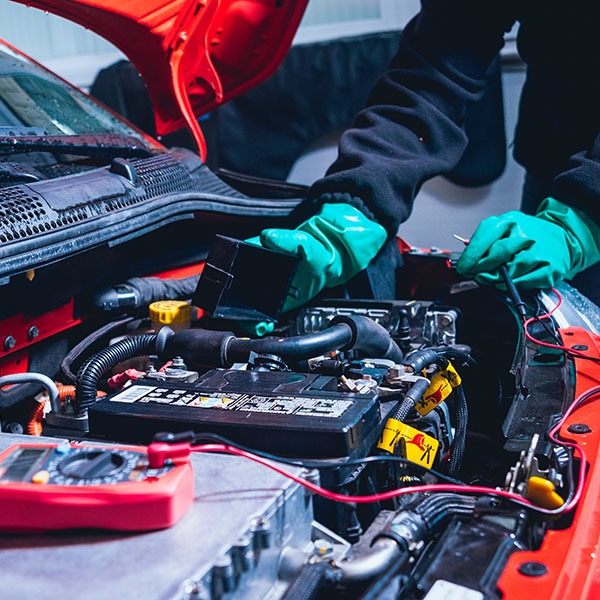



Garberson Andrew. 2024. A study of EV driving ranges by state finds an overlooked stat. Recurrent.
Zachary Needell, WeiWei, Jessika E.Trancik. 2023. Strategies for beneficial electric vehicle charging to reduce peak electricity demand and store solar energy. Institute for Data, Systems, and Society, Massachusetts Institute of Technology.
Sharma Anjali, Shiwang Jinyu, Lee Anna and Peng Wei. 2023. Equity implications of electric vehicles: A systematic review on the spatial distribution of emissions, air pollution and health impacts. Ashank Desai Centre for Policy Studies, Indian Institute of Technology, Department of Civil and Environmental Engineering, The Pennsylvania State University, Department of Geosciences, The Pennsylvania State University, School of International Affairs, The Pennsylvania State University.
Haghania Milad, Spreib Frances, Kazemzadehb Khashayar, Shahhoseinic Zahra, Aghaeid Jamshid. 2023. Trends in electric vehicles research. Centre for Integrated Transport Innovation (rCITI), School of Civil and Environmental Engineering, The University of New South Wales; Department of Space, Earth and Environment, Chalmers University of Technology, Transport for NSW, School of Engineering and Technology, Central Queensland University.
International Energy Agency. 2023. Global EV Outlook 2023.
Davis Stacy C., Boundy Robert G. 2022. Transportation Energy Data Book. Oak Ridge National Laboratory.
Romero-Lankao Patricia, Wilson Alana and Zimny-Schmitt Daniel. 2022. Inequality and the future of electric mobility in 36 U.S. Cities: An innovative methodology and comparative assessment. National Renewable Energy Laboratory.
Naumov Sergey, Keith David R., Sterman John D. 2022. Accelerating vehicle fleet turnover to achieve sustainable mobility goals. MIT Sloan School of Management.
LaMonaca Sarah, Ryan Lisa. 2022. The state of play in electric vehicle charging services – A review of infrastructure provision, players, and policies. UCD Energy Institute.
Gohlke David, Zhou Yan, Wu Xinyi, and Courtney Calista, 2022. Assessment of Light-Duty Plug-in Electric Vehicles in the United States. Energy Systems and Infrastructure Analysis Division, Argonne National Laboratory.
Cost per kWh of electricity: $0.1409 (Feb 2024)
Cost per gallon of gas: $3.029 (Feb 2024)
MPG: 25 miles.
Miles per kWh: 3 miles.
Miles traveled per year: 17,887
The cost of gasoline is miles/year / miles/gallon * dollar/gallon = dollars/year
Plugging in the averages, we get 17,887 / 25 * 3.029 = $2,167
The cost of electricity is miles/year / miles/kWh * dollar/kWh = dollars/year
Plugging in the averages, we get 17,887 / 3 * 0.1409 = $840
Using this framework, we find that the average annual fuel savings per year is $1,327
EV maintenance costs are 0.061 cents per mile versus ICE maintenance costs of 0.101 cents per mile. EV maintenance is 0.04 cents lower per mile. The average Minnesota car travels 17,887 miles per year, and so will save $715 per year on maintenance.
In recent years, the shift towards Zero Emission Vehicles (ZEVs), encompassing Battery Electric Vehicles (BEVs) and Plug-in Hybrid Electric Vehicles (PHEVs), has been recognized not only for its environmental benefits but also for its significant potential in reducing health-related costs due to air pollution. Studies anticipate that a nationwide transition to electric vehicles (EVs) could culminate in $72 billion in health care cost savings annually by the year 2050. This projection is grounded in the reduction of pollutants that contribute to respiratory diseases, heart conditions, and premature deaths.
Assuming a progressive increase in the adoption of EVs, reaching a milestone where 50% of all vehicles in the U.S. are electric by 2050, we estimate this to represent about 137.5 million EVs, considering the current total of approximately 275 million registered vehicles.
Dividing the projected total health savings of $72 billion by the estimated number of EVs yields an annual health savings of approximately $524 per vehicle. This figure underscores the economic incentives of accelerating the adoption of EVs, beyond the imperative of environmental preservation. It highlights the tangible benefits in healthcare cost savings, emphasizing the role of EVs in fostering a healthier future.
Note that the information provided in this analysis is based on projections. Actual outcomes may vary based on numerous factors, including technological advancements, government policies, consumer preferences, infrastructure development, and economic conditions.
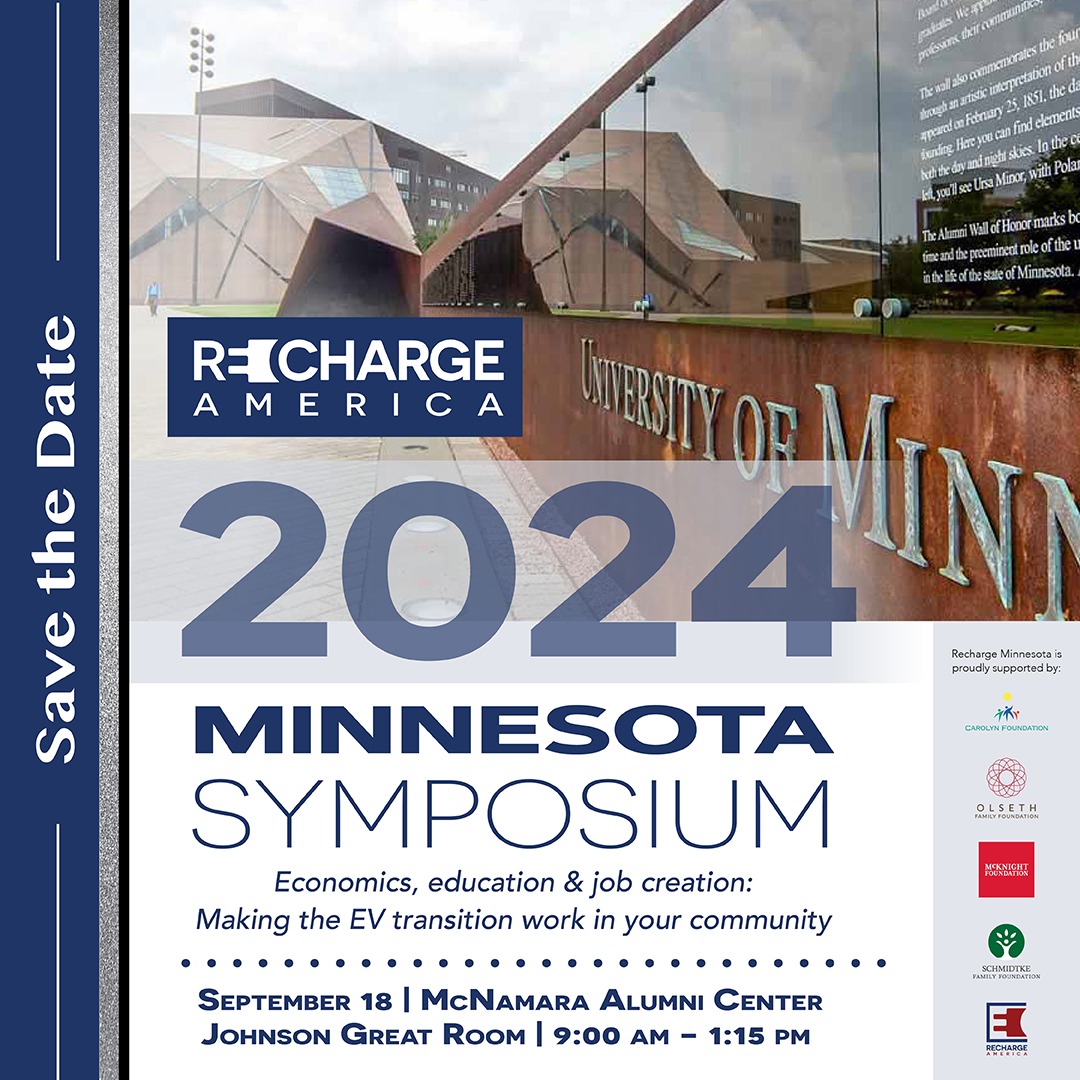
Join us for our Annual Symposium at the McNamara Alumni Center in the Johnson Great Room.
This year’s theme is Economics, education, job creation: Making the EV transition work in your community.
We look forward to exploring these topics with you and building a plan for the future of electrification in Minnesota.
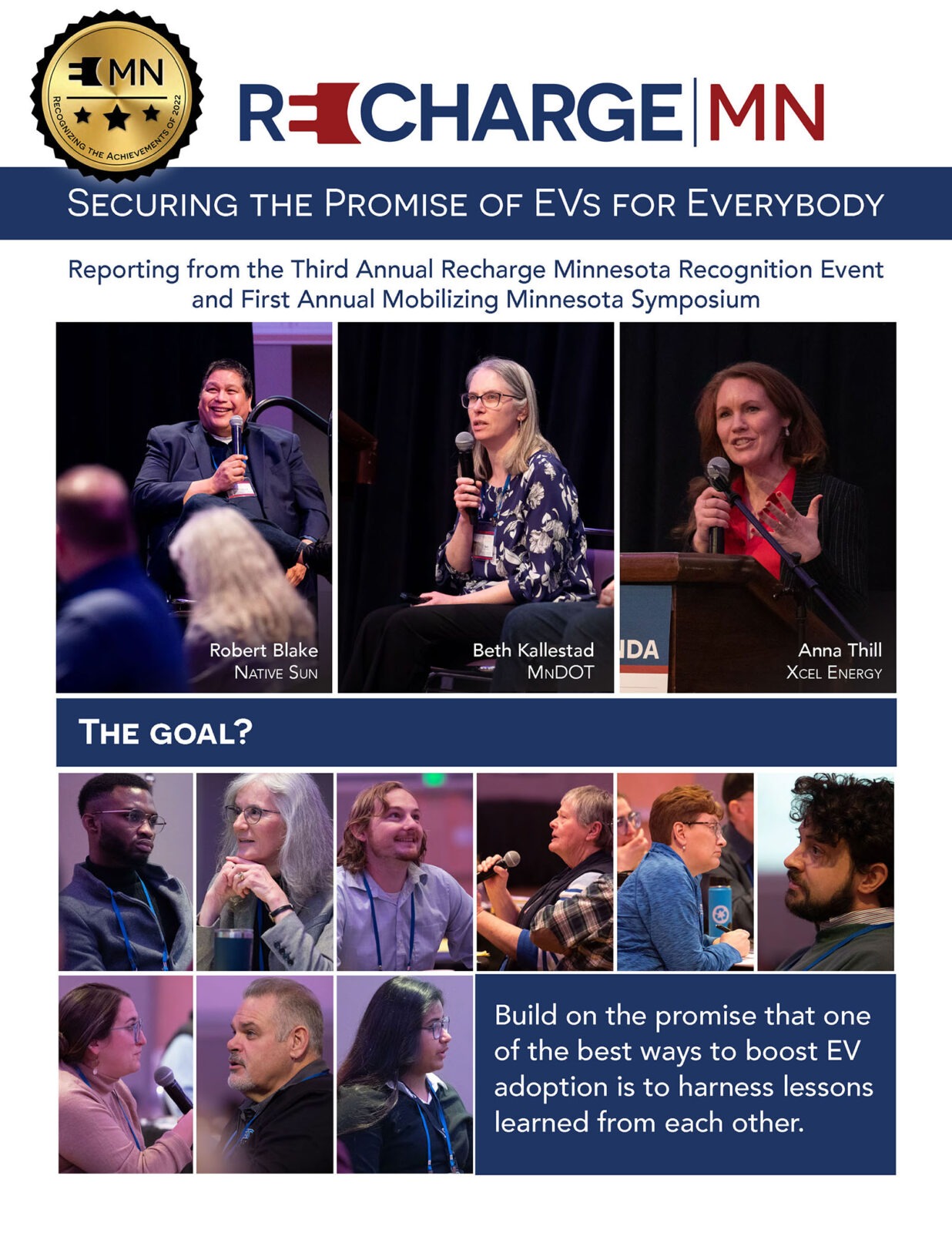
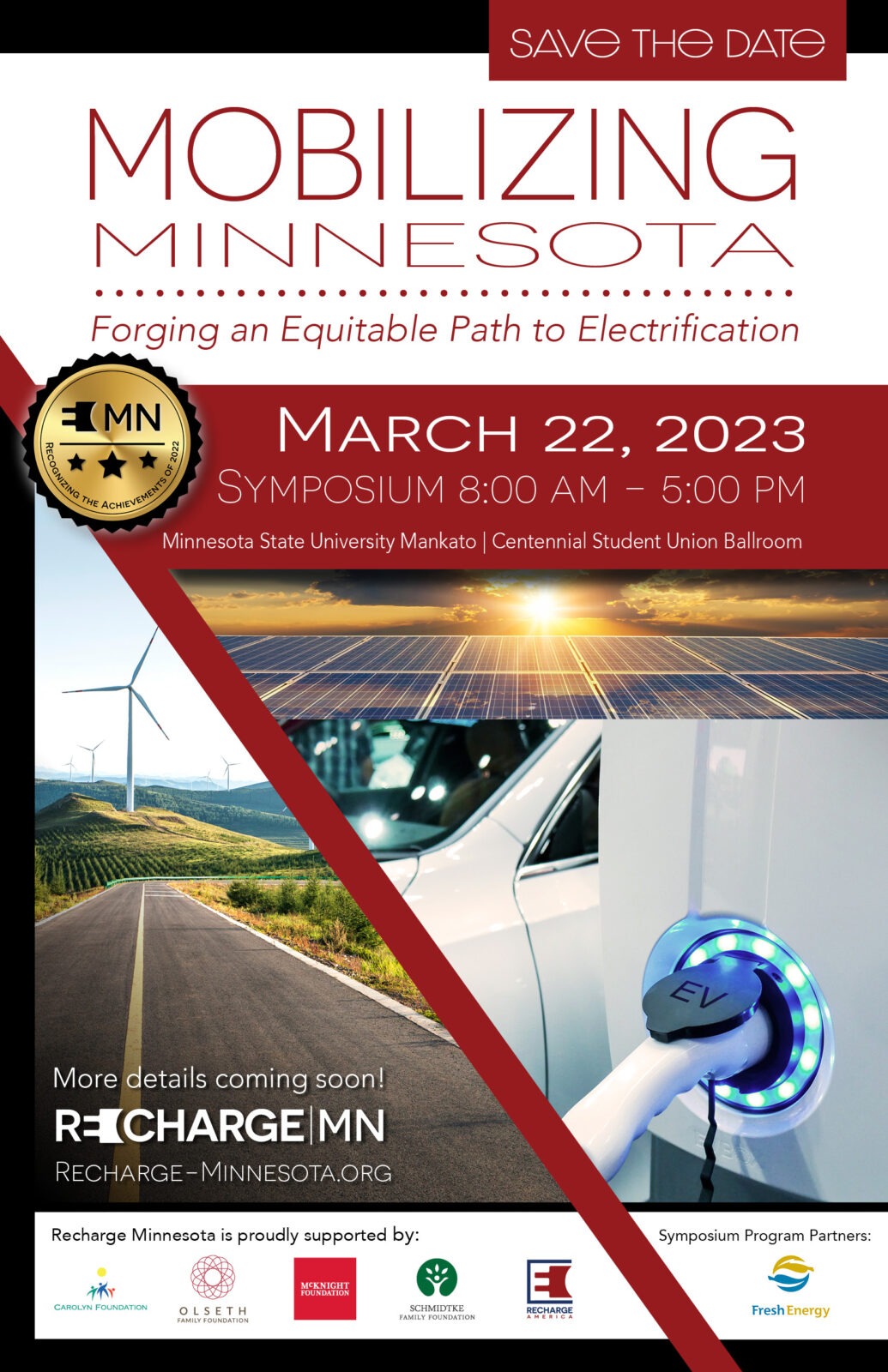
With technology advancing rapidly, new policies in place and funding being allocated throughout the country, Minnesota is making significant progress in transportation electrification. As the industry evolves, Recharge Minnesota remains firmly committed to providing resources to leaders in business, non-profit, academia and government across Greater Minnesota that help them secure the benefits from the emerging electric economy.
At this pivotal moment of planning, innovation, and collaboration, equal access must stand at the center of our considerations for ensuring that everyone across Minnesota can benefit from the transition.
Join Recharge Minnesota for a first-of-its-kind symposium that will:
Recharge Minnesota is pleased to spotlight the growing group of participants in this statewide program for EV leaders.
Entities from throughout Greater Minnesota participated in the third annual recognition ceremony at our first ever Mobilizing Minnesota Symposium.
Recognition partners include Recharge America, Fresh Energy, the Olseth Family Foundation, and this group of leaders and communities from across Minnesota.
Organizations recognized by Recharge Minnesota have each pledged to take positive actions related to EVs that fit their circumstances and share their experiences to help others learn. The video on the left spotlights their work.
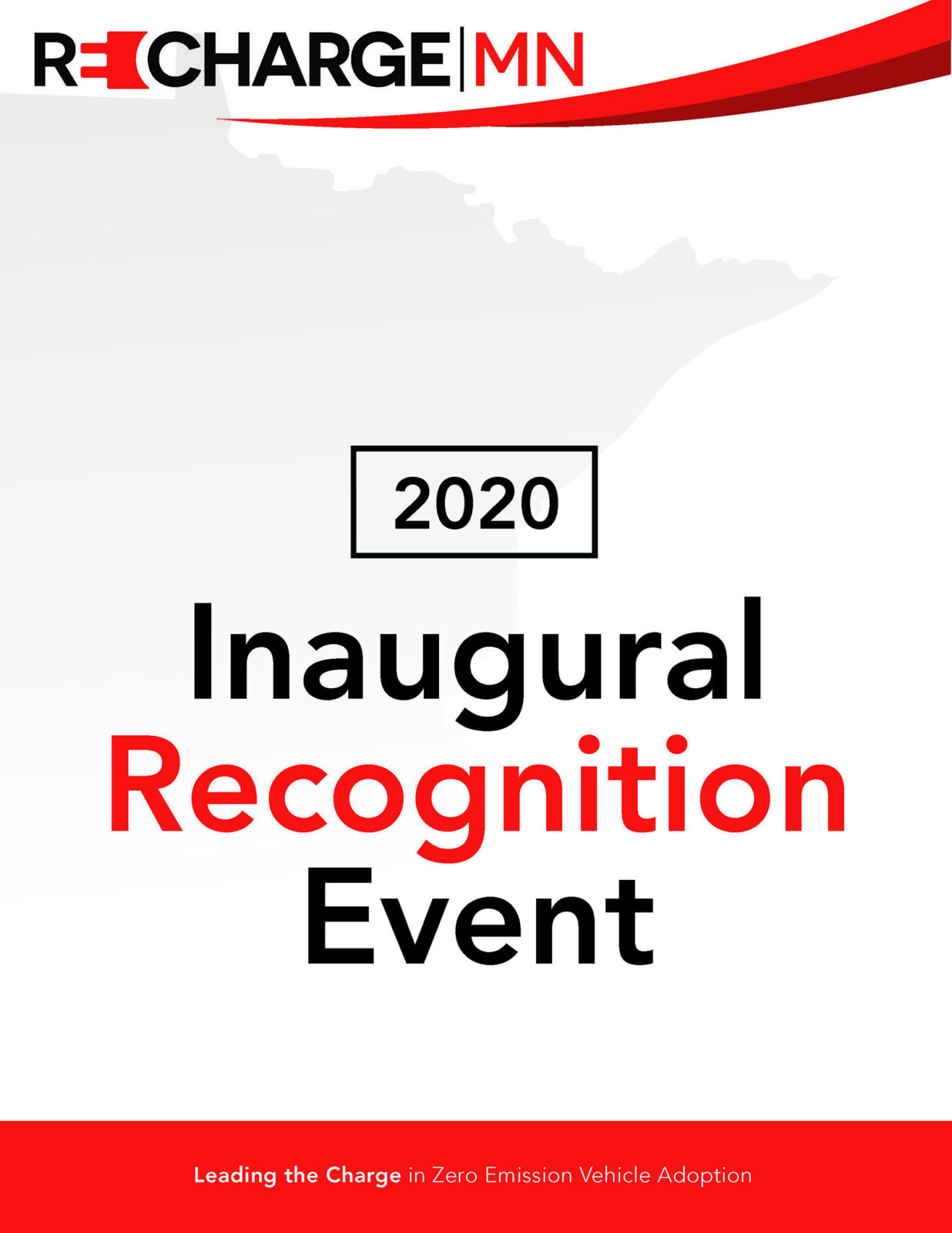
Minnesota’s Governor Tim Watz
Recharge MN 2020 Highlights
Fresh Energy’s Michael Nobel